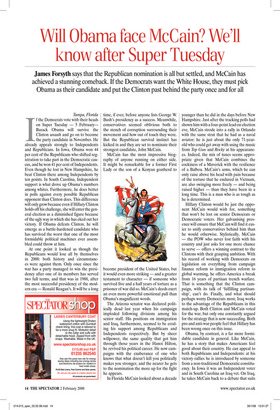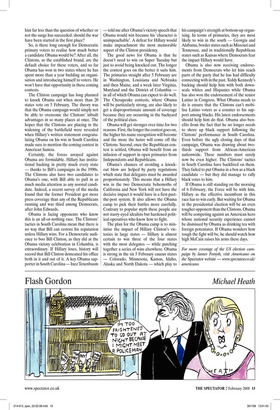Will Obama face McCain? We’ll know after Super Tuesday
James Forsyth says that the Republican nomination is all but settled, and McCain has achieved a stunning comeback. If the Democrats want the White House, they must pick Obama as their candidate and put the Clinton past behind the party once and for all Tampa, Florida If the Democrats vote with their heads on Super Tuesday — 5 February— Barack Obama will survive the Clinton assault and go on to become the party candidate in November. He already appeals strongly to Independents and Republicans. In Iowa, Obama won 44 per cent of the Republicans who shifted registration to take part in the Democratic caucus, and he won 41 per cent of Independents. Even though he lost in New Hampshire, he beat Clinton there among Independents by ten points. In South Carolina, Independent support is what drove up Obama’s numbers among whites. Furthermore, he does better in polls against every possible Republican opponent than Clinton does. This difference will only grow because even if Hillary Clinton holds off his challenge, she will enter the general election as a diminished figure because of the ugly way in which she has eked out her victory. If Obama defeats Clinton, he will emerge as a battle-hardened candidate who has survived the worst that one of the most formidable political machines ever assembled could throw at him.
At one point it looked as though the Republicans would lose all by themselves in 2008: both history and circumstances were against them. Only once since the war has a party managed to win the presidency after one of its members has served two full terms, and that was in 1988, after the most successful presidency of the mod
SpecShop_spec_02.02.08 1/29/08 12
ern era — Ronald Reagan’s. It will be a long time, if ever, before anyone lists George W. Bush’s presidency as a success. Meanwhile, conservatives seemed oblivious both to the stench of corruption surrounding their movement and how out of touch they were. But the Republican survival instinct has kicked in and they are set to nominate their strongest candidate, John McCain.
McCain has the most impressive biography of anyone running on either side. It might be remarkable for a former First Lady or the son of a Kenyan goatherd to become president of the United States, but it would even more striking — and a greater testament to character — if someone who
13 PM P
survived five and a half years of torture as a prisoner of war did so. McCain’s deeds exert an even more powerful emotional pull than Obama’s magnificent words.
The Arizona senator was declared politically dead last year when his campaign imploded following divisions among his senior staff. His positions on immigration and Iraq, furthermore, seemed to be eroding his support among Republicans and Independents respectively. But by sheer willpower, the same quality that got him through those years in the Hanoi Hilton, he revived his political career. He now campaigns with the exuberance of one who knows that what doesn’t kill you politically makes you stronger, and the nearer he gets to the nomination the more up for the fight he appears.
In Florida McCain looked about a decade younger than he did in the days before New Hampshire. Just after the tracking polls had shown him with a four-point lead on election eve, McCain strode into a rally in Orlando with the same strut that he had as a naval aviator: he is just about the only 71-yearold who could get away with using the music from Top Gun and Rocky at his appearances. Indeed, the mix of tunes seems appropriate given that McCain combines the cockiness of a Maverick with the resilience of a Balboa. McCain’s arms, which he can only raise above his head with pain because of the torture that he endured in Vietnam, are also swinging more freely — and being raised higher — than they have been in a long time. This is a man who is as tough as he is determined.
Hillary Clinton would be just the opponent McCain would wish for, something that won’t be lost on senior Democrats or Democratic voters. Her galvanising presence will ensure that McCain will find it easier to unify conservatives behind him than he would otherwise. Stylistically, McCain — the POW who never lost faith with his country and just asks for one more chance to serve — offers a winning contrast to the Clintons with their grasping ambition. With his record of working with Democrats on legislation on everything from campaign finance reform to immigration reform to global warming, he offers America a break from 16 years of partisan trench warfare. That is something that the Clinton campaign, with its talk of ‘fulfilling partisanship’, can’t do. Finally, and what should perhaps worry Democrats most, Iraq works to the advantage of the Republicans in this match-up. Both Clinton and McCain voted for the war, but only one constantly argued for the strategy that is now succeeding. Both pro and anti-war people feel that Hillary has been wrong once on this issue.
Obama, by contrast, is a far more formidable candidate in general. Like McCain, he has a story that makes Americans feel good about their country. He can appeal to both Republicans and Independents: at his victory rallies he is introduced by someone from a non-traditional Democratic constituency. In Iowa it was an Independent voter and in South Carolina an Iraq vet. On Iraq, he takes McCain back to a debate that suits him far less than the question of whether or not the surge has succeeded: should the war have been started in the first place?
So, is there long enough for Democratic primary voters to realise how much better a candidate Obama would be? After all, the Clintons, as the established brand, are the default choice for these voters, and so far Obama has won in two states where he has spent more than a year building an organisation and introducing himself to voters. He won’t have that opportunity in these coming contests.
The Clinton campaign has long planned to knock Obama out when more than 20 states vote on 5 February. The theory was that the Obama campaign would simply not be able to overcome the Clintons’ inbuilt advantages in so many places at once. The hopes that the Clintons are placing in the widening of the battlefield were revealed when Hillary’s written statement congratulating Obama on his win in South Carolina made sure to mention the coming contest in American Samoa.
Certainly, the forces arrayed against Obama are formidable. Hillary has institutional backing in pretty much every state — thanks to Bill’s campaigns in the 1990s. The Clintons also have two candidates to Obama’s one, with Bill able to pull in as much media attention as any normal candidate. Indeed, a recent survey of the media found that the former President got more press coverage than any of the Republicans running and was third among Democrats, after John Edwards.
Obama is facing opponents who know this is an all-or-nothing race. The Clintons’ tactics in South Carolina mean that there is no way that Bill can restore his reputation unless Hillary wins. For a Democratic audience to boo Bill Clinton, as they did at the Obama victory celebration in Columbia, is extraordinary. If Hillary loses, history will record that Bill Clinton demeaned his office both in it and out of it. A key Obama supporter in South Carolina — Inez Tenenbaum — told me after Obama’s victory speech that Obama would win because his ‘character is unimpeachable’. A defeat for Hillary would make impeachment the most memorable aspect of the Clinton presidency.
The good news for Obama is that he doesn’t need to win on Super Tuesday but just to avoid being knocked out. The longer the contest goes on the better it suits him. The primaries straight after 5 February are in Washington, Louisiana and Nebraska and then Maine, and a week later Virginia, Maryland and the District of Columbia — in all of which Obama can expect to do well. The Chesapeake contests, where Obama will be particularly strong, are also likely to get a disproportionate amount of coverage because they are occurring in the backyard of the political class.
Obama will get stronger over time for two reasons. First, the longer the contest goes on, the higher his name recognition will become and the more the lustre will come off the Clintons. Second, once the Republican contest is settled, Obama will benefit from an infusion of support in open primaries from Independents and Republicans.
Obama’s chances of avoiding a knockout blow are helped by party regulations which state that delegates must be awarded proportionately. This means that a Hillary win in the two Democratic behemoths of California and New York will not have the decisive impact it would have in a first-pastthe-post system. It also allows the Obama camp to pick their battles more carefully. Contrary to popular myth these people are not starry-eyed idealists but hardened political operatives who know how to fight.
The plan for the Obama camp is to minimise the impact of Hillary Clinton’s victories in large states — Hillary is almost certain to win three of the four states with the most delegates — while patching together a series of wins elsewhere. Obama is strong in the six 5 February caucus states — Colorado, Minnesota, Kansas, Idaho, Alaska and North Dakota — which play to his campaign’s strength at bottom-up organising. In terms of primaries, they are most likely to win in the south — Georgia and Alabama, border states such as Missouri and Tennessee, and in traditionally Republican states such as Kansas where Democrats fear the impact Hillary would have.
Obama is also now receiving endorsements from Democrats who let him reach parts of the party that he has had difficulty connecting with in the past. Teddy Kennedy’s backing should help him with both downscale whites and Hispanics while Obama has also won the endorsement of the senior Latino in Congress. What Obama needs to do is ensure that the Clintons can’t mobilise Latino voters as a counter to his support among blacks. His latest endorsements should help him do that. Obama also benefits from the fact that he no longer needs to shore up black support following the Clintons’ performance in South Carolina. Even before the ugly closing days of that campaign, Obama was drawing about twothirds support from African-American nationwide. These numbers must surely now be even higher. The Clintons’ tactics in South Carolina have backfired on them. They failed to put Obama in a box as a black candidate — but they did manage to rally black votes to him.
If Obama is still standing on the morning of 6 February, the Force will be with him. Hillary as the effective incumbent in this race has to win early. But waiting for Obama in the presidential election will be an even tougher opponent than the Clintons. Obama will be competing against an American hero whose national security experience cannot be dismissed by Obama as drinking tea with foreign potentates. If Obama wonders how tough the fight will be, he should watch how high McCain raises his arms these days.
For more coverage of the US election campaign by James Forsyth, visit Americano on the Spectator website — www.spectator.co.uk/ americano.



































































 Previous page
Previous page